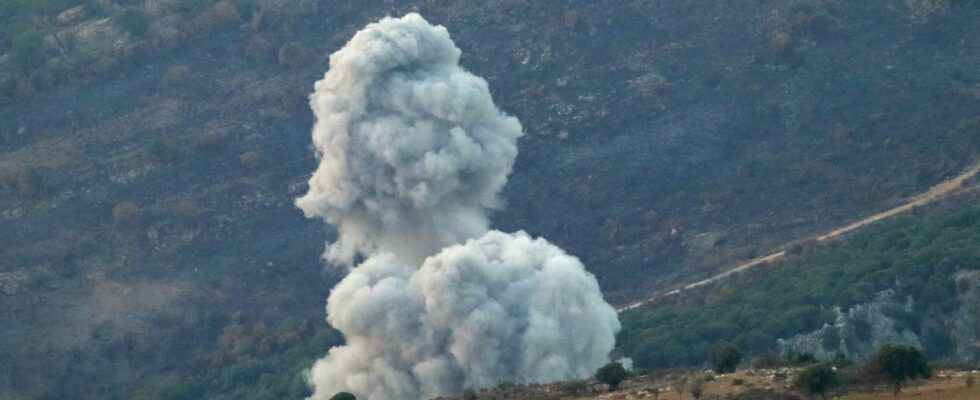“Ceasefire”, “settlement as quickly as possible” of the conflict between Israel and Hezbollah… Calls to end the war between the two parties in the Middle East are increasing. The American President’s special envoy, Amos Hochstein, affirmed this Monday, October 21 in Beirut that Washington was working for a settlement “as quickly as possible” of the conflict on the basis of Resolution 1701 of the United Nations (UN).
“The commitment we have is to resolve this conflict on the basis of UN Resolution 1701, that’s what the solution is going to look like,” he said. This UN Security Council resolution, adopted unanimously on August 11, 2006, marked the end of the previous war between Israel and Hezbollah. This, which occurred in July 2006 for a period of 33 days, had already led the Israeli army to carry out a ground offensive in southern Lebanon, accompanied by intense bombings throughout the country.
“Long term solution”
Resolution 1701 stipulates in particular that only Blue Helmets (UNIFIL) and the Lebanese army must be deployed in southern Lebanon bordering Israel. As the United Nations reminds us on their websitethis resolution “calls on Israel and Lebanon to support a permanent ceasefire and a long-term solution”, including “full respect by both parties for the ‘blue line’ and security arrangements aimed at preventing the resumption of hostilities.
Stretching 120 kilometers along the southern border of Lebanon and the northern border of Israel, the “blue line” is not a border but “a temporary withdrawal line established by the United Nations in 2000 in the practical purpose of confirming the withdrawal of Israeli forces from southern Lebanon,” the UN said. This “blue line” has been one of the central elements of Resolution 1701 since the 2006 war, with the United Nations Interim Force in Lebanon acting as its temporary guardians.
After the 2006 war between Israel and Hezbollah, the Lebanese army deployed south of the Litani River in application of resolution 1701, which theoretically prohibits the deployment of any other military force there. Hezbollah, which should also have left the area, according to the UN text, however retained a presence in the region. Israel has regularly called for the real application of UN Security Council Resolution 1701, wanting the pro-Iranian Lebanese Shiite movement to withdraw north of the Litani River.
The UN text did not resist the new escalation that broke out following the unprecedented Hamas attacks against Israel on October 7, 2023. On September 30, 2024, the Jewish state launched what the Israeli army described as a “limited” ground incursion into southern Lebanon. An “extremely dangerous development” according to UNIFIL. “Any entry into Lebanon constitutes a violation of the sovereignty and territorial integrity of Lebanon, as well as a violation of resolution 1701,” says UNIFIL. This, with 10,000 men including a contingent of 700 French, accused Israeli troops of firing “repeatedly” and “deliberately” on its positions.
“No one has done anything to implement it”
“Resolution 1701 succeeded in ending the war in 2006 but […] no one has done anything to implement it,” lamented Amos Hochstein on Monday. According to the American president’s special envoy, “the commitment of both parties to respect Resolution 1701 is not sufficient.” In Beirut , Amos Hochstein also met with Lebanese Prime Minister Najib Mikati, who called on the UN to adopt a resolution for an “immediate ceasefire” and renewed the commitment to implement Resolution 1701.
On October 19, Josep Borrell, the head of European diplomacy, suggested strengthening the mandate of UNIFIL, currently unable to intervene between Hezbollah and Israel. Josep Borrell also called for the application of United Nations Resolution 1701. This position is also shared by France. French diplomacy, through Foreign Minister Jean-Noël Barrot, regularly calls for a “ceasefire”, “respect for international and humanitarian law” and the “implementation of resolution 1701”.
But this mission is proving particularly difficult in the midst of an open conflict between Israel and Hezbollah, as Calev Ben-Dor, a former analyst at the Israeli Ministry of Foreign Affairs, recalled to AFP on September 19. “Neither France nor the United States nor even the Lebanese government seem to have any influence on the withdrawal of Hezbollah from the border and on compliance with United Nations Security Council Resolution 1701,” he said. noted.
